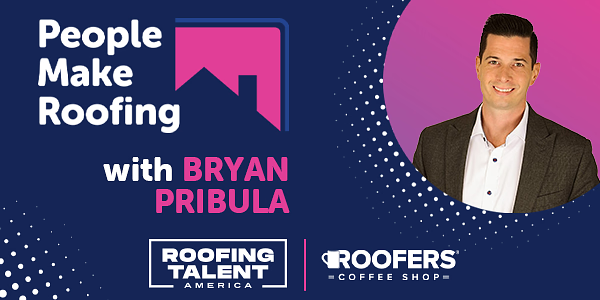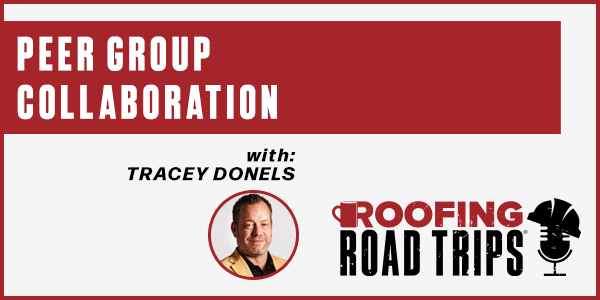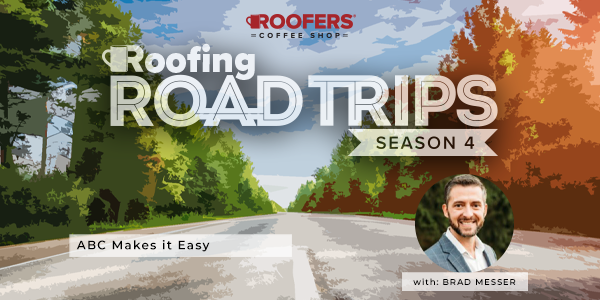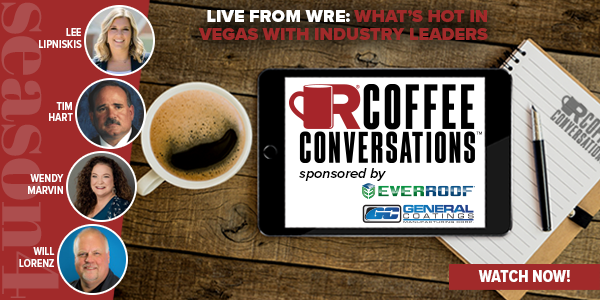People Make Roofing - Bryan Pribula - PODCAST TRANSCRIPT
April 14, 2025 at 12:59 p.m.Editor's note: The following is the transcript of a live interview with Bryan Pribula, Branch Manager at Eskola Roofing & Waterproofing. You can read the interview below, listen to the podcast or watch the recording.
Intro: Welcome to People Make Roofing, a Call to action led by McCormack Partners and RoofersCoffeeShop. We're tackling the industry's biggest challenges, from outdated misconceptions to the widening skills gap. Our mission: To show the next generation the true potential of roofing, including the diverse opportunities, endless growth possibilities and a chance to make a lasting impact. Join us as we share unfiltered stories from industry professionals across North America, inspiring and guiding the future of roofing. This is People Make Roofing.
Luke McCormack: Good morning. I am Luke McCormack, your co-host, CEO of Roofing Talent America.
Heidi J Ellsworth: Hi, I'm Heidi Ellsworth and I am the president of RoofersCoffeeShop and the co-host of People Make Roofing. We are here to celebrate the roofing industry and what better way than to visit with the people?
So Luke, we have Bryan here today. I'm so excited. Bryan, we would love for you to introduce yourself and tell us a little bit about what you're doing, your company, your history and roofing. Just give us a little bit of your story.
Bryan Pribula: For sure. Well, good morning and thanks for having me first and foremost. But I'm Bryan Pribula. I am the branch manager for Eskola Roofing here in Nashville, Tennessee. Eskola is a top 10 national roofing contractor and building contractor in the United States. Been around for close to around 50 years now and continuing to grow throughout the southeast through acquisitions and opening up new offices and different avenues of the U.S.
We focus on total building envelope, so from service mindset to re-roof capital projects to whole waterproofing division as well. So we can really totally encompass everything and give our customers the best product. At the end of the day, we're looking to grow by 2027, 2028 to be about a billion-dollar company and capturing the U.S by storm.
Luke McCormack: Fantastic. Well, Bryan, you are a superstar in this industry and Eskola is one of the best roofing companies I've ever worked with in my 10 years in this industry. And I wore my green suit just for you guys. So we're looking forward to getting into it, but just to set the scene, I set this campaign up in April 2021 and the reason for that is because there wasn't enough online about the roofing industry.
. And when I joined the industry and I seen the people in the industry, the growth, the career prospects, the success, I thought this may be the best kept secret in construction. So People Make Roofing was started to shine a light on the key people in the industry who are so far away from the stereotypes that have plagued the industry. In my opinion, people out with the industry see roofing is dirty, outdated, unsafe, no career prospects, unscrupulous people and we know that could not be further away from the truth.
And the purpose is to create content for school-leavers, university leavers, career guidelines counselors, people from other industries so that we can bring more blood into our great industry. And what better way to do it than to shine a light on superstars like yourself, hear your story and hear your advice for people that want to join our industry and even best practice for other leaders in commercial roofing businesses.
When we were working with you as a candidate, Bryan and we placed you at Eskola, it was actually my mum, Sharon, who made the placement and both of us agreed from the outset you're a superstar and whatever you go, they will be lucky to get you. And what really stuck out to me, Bryan, was that you didn't start as a roofer and build your way up and then get into management. You had a different pathway. You were actually originally in banking.
So I'd love to hear a bit about your story and what inspired you to actually pursue a career in roofing.
Bryan Pribula: For sure. First and foremost also thank you guys for the kind comments. I appreciate that. I want to say that my path's definitely started on a different journey than most folks. As you said, Luke, my background was in corporate finance and in corporate aviation. My family had always been in engineering or the trades and a little bit of construction so I had that upbringing growing up as to that kind of mindset, as to what the physical labor looked like and having that instilled in my upbringing and my pedigree if you will.
So around 2008 when I was in finance, I was looking at long-term things and of course we had the recession. I'd just gotten out of college and everything and trying to find out, well, what's going to be a good career path and a good change for a young professional that's almost recession-proof and something that could stand the test of time and still be financially capable of providing for my family down the road?
And I really started looking at different industries and whatnot and transitioning out of the finance and aviation sector. One of my colleagues worked at Lowe's corporate Headquarters in Mooresville, North Carolina and had an opportunity for there. So I took that opportunity and started diving into more of the PM role, senior PM role with Lowe's corporate and handling some of their exterior construction sales on the eastern Seaboard. And so I did that for a few years, managing the exterior and interior sales teams and both the subcontractors as well as the sales professionals and dialing into them and helping them from a high level, trying to fine tune things and truly be able to really work on helping people.
People buy from people. At the end of the day, we really want to build those relationships and have long-term partnerships and not just go after those short-term gains, which a lot of folks really dive after and that's just not my mindset and how I want go to market and do business with people.
So after that, I worked for Lowe's till about 2017 and then had the opportunity to go to Baker Roofing, which is a big candidate as well and worked with them for a long time. Learned a lot of the industry. Was fortunate to work with a Raise the Roof consultant back then where I learned literally the ins and outs of the trade at a very fast pace to really get me up to speed compared to some folks that would normally go through the ranks of starting as a laborer and working in the field. Rubbing elbows with someone that's got 25 years of experience from a consultant and construction side really put me ahead of a lot of people in the game and I really took it to a new level.
Diving into the NRCA manual reading, reading the [inaudible 00:06:49] manual, trying to get that information so when I would go and talk to clients or talk to other roofers, I want to be able to speak intellectually. I want to be able to be a shining star so when I am in front of people, people understand what I'm talking about and it's the real deal, not just a facade.
And then from there, I've worked for a couple of other different companies and building their teams up and being successful in the industry throughout the southeast. And my biggest thing, and I know Luke and Sharon, you know this, your mom knows it too, is that culture is huge for me. I want to make sure that wherever I land and whoever I work for, it is a place of culture. We work hard, play hard kind of a mentality. I want people that are on the team that I'm on to enjoy coming to work to be successful and to understand that yeah, we're going to laugh and play, but we also got to roll our sleeves up and get the job done. Because whatever I ask of people on the team, I want to make sure that I can do it and show them and lead by example.
Heidi J Ellsworth: I love that. I love that story because so many people talk about that you have to have been born into roofing or have a family or generational, whereas I know so many people who have found roofing a little bit later in their career. Not too much but enough, and have just like you have totally embraced it and made it part of your DNA. I love the fact that you read the NRCA manual. The NRCA people are going to love hearing that. That's pretty good.
So what I'm curious about, Bryan, is right now in this position; and you gave such a great introduction and just with the growth of your company; but what is the most rewarding part of your job right now?
Bryan Pribula: I would say because I just started at Eskola back in late August and the national office here is a beast here for Eskola. It's one of the largest markets that we're in as a company. Has a capability of being a 50 million plus office. So getting able to see a team that's in that intricacies of being such a large, well-oiled machine and seeing how people work and delegate together, I think that's like it's the orchestra, if you will. It is the beauty of hearing the music behind the scenes and being able to see everyone's forte and being able to coach them through the moments that maybe they need help in.
That's the biggest thing that I see is it's great to do $10 million roofing projects and there's a science behind it clearly, but seeing the team do it and work as a team, that's the biggest reward that I get to see every day coming to work. Is just seeing everybody, no matter what the role is, that they have a smile on their face, that you see the passion behind what they're doing and that's the biggest reward.
Luke McCormack: Amazing. And I think that like you touched on Bryan, that there's this preconception that to become a manager in the roofing industry, you need to move up the career ladder and you've obviously not done that. And there's so many other people from other professions that could do a job in our industry, but they either think they're not qualified for it or they haven't been in the industry for long enough. But realistically, especially with a company like Eskola, with the onboarding and the training and the development, which is given you truly don't need to have had a roofing background to be successful in the industry.
What would your message be to people in construction or other industries that are maybe a bit disillusioned about their career about what roofing can give them? Because you've got a very unique background from corporate finance, to aviation, to now being in roofing. So two questions is how does roofing differ to those industries and what advice would you give to people from other industries that maybe would like to consider commercial roofing?
Bryan Pribula: For sure. I think it's like what you guys nailed on earlier. It's the misconception. People think of roofing as an industry that's just dirty, doesn't have anything with it, doesn't provide for your family. It's a place that maybe you could fall back into depending on your socio-economical background and how that may lay out.
But at the end of the day it's not. There's a science behind it. Clearly from aviation, there's a lot of compliance and regulations. I need to be able to look and understand the specs. It's no different than when I'm looking at design for new construction or for working with a roof consultant on a large, high-scale project. I need and my team needs to be able to dive in to be able to facilitate what we're looking at and put it on a roadmap to success and be able to walk that at each simulation step.
So I would say that whether you're in construction, whether you're in finance, whether you're a school teacher, whatever else, everybody has fortes and whatever else they can dial in and bring to the commercial roofing and residential roofing industries. There's so many different avenues that are out there that you can provide for your family and have success. And it's recession-proof industry. It's been time-tested through many recessions, through pandemics, everything else. We were essential workers. We were able to still come and provide for our families during a time when so many folks in the country didn't have that capability. You have to look at roadmaps and it's no different than building anything else out. What are the values, what are the cons, what are the pros?
In my opinion, if you look at that and weight it, to me, it's a no-brainer.
Speaker 1: Really what you're saying too, when you think about the perception. That perception, people don't really think about The roof above my head is protecting everything that I have. My family, my treasures, my business, whatever it may be. And so as we're looking at this next generation coming in, I'd love to talk about that perception. There's a lot of perceptions, Bryan. There's perceptions of us as a society, but then there's the young kids coming up who are looking at this and looking at the specs, looking at the details, looking at the hands-on. There's just a lot of cool stuff. Being outside.
There are things that, once young people get their heads wrapped around it, they're like, "Yeah, this is for me. I'd like to be outside. I'd rather be rock climbing. I'd rather be doing this kind stuff or I'd rather be selling and doing all of that."
And we also have to worry about the parents. So the parents also are kind of like, "Do I really want my kids going into roofing?" So as you are speaking to this younger generation of future professionals coming up and their parents, what would you say to them about getting into the roofing industry and what a great career it is from more of that younger perspective?
Bryan Pribula: Yeah, I'm glad you brought that up because I feel that especially with partnerships like with the Roofing Alliance and whatnot with major universities for pre and post-secondary options and even now companies that are looking to utilize those avenues as well for folks that are coming in with no experience and utilizing those programs to be able to teach and facilitate folks as to, hey, there's the science behind this. Here's Roofing 101.
If you look at architects that go to school, they literally have maybe a semester or two of that at most about the roofing and then it's on. And clearly, when we're diving into these things and we're spending so much time going through this, it's like, well, no one ever thinks about that or whatever else. We just thought about the aesthetics portion of it and not the science behind it.
So I think, as Luke said, going to the high schools and talking to the guidance counselors and going to the career days and being able to say, "Hey, this is no different than any other trade. HVAC, plumbing, what else? We need to have those apprenticeships going in so you can see and build your career up through this is what it looks like for the first year or two. Clearly you're making more money than you would be if you were going to look at different avenues, whether that's retail, hospitality, what have you. Starting off with a trade that will be successful for your entire life"
And then if you're already going more the professional route, then looking at, like I said earlier, with the Roofing Alliance and looking at the post-secondary and looking at these collegiate programs that are available now to then dive in and facilitate your career even further, whether that's project management, whether that's sales, whether that's any type of administrative background in roofing. There's so many different behind the scenes analytics that are going on that make this whole Ferris wheel spin. There's a lot more pieces of the pie than just sales operations and this. There's so many different positions available avenues that will give you six figure success in a very relatively short timeframe versus going to school for eight years and trying to figure out what you want to do for your life.
Heidi J Ellsworth: Yeah. And within a group of people that are so welcoming. This industry is so welcoming to everyone. Luke?
Luke McCormack: Yeah, a 100%. Particularly for me coming from the UK into the American market as a recruiter. I've had to pinch myself a few times of how warm and welcoming the people have been in the American roofing industry. And I've tried to do my part to be part of the solution to fix the problem in terms of the downfall of new people coming in and the professional image.
But something that's really stuck out to me is that when you look at the problems that we're facing as an industry in terms of labor, in terms of the marketing of the industry, I asked myself who should fix this? Is it the government? Is it the associations? Is it the suppliers? Is it the installers? Is it the service providers?
And within the American roofing market, what you've got is everyone is doing something to try and put the industry forward, educate young people and bring them in. And Bryan, Eskola have got something new coming out with Eskola University where they are exactly doing that. They're trying to solve the problem. Would you like to share a bit about Eskola University and what you guys are doing for the industry to bring in some fresh blood?
Bryan Pribula: Most definitely. So we have literally invested thousands of hours into each different intricate part of how we operate and go to market. So if it's a project manager coming in, if it's an estimator coming, if it's a sales ... Literally giving them a step-by-step scenario of how to be successful. Looking at the buzzwords and the terminology, understanding how it's going down and what you're doing and then giving them that layout of how to go up through and be successful within that specific position.
We've been, I think probably close to the last four or five months, going through and literally, like I said, putting thousands of hours into actual data-driven information that can allow when we bring different folks in or someone's transitioning and going from someone that's already internal and transitioning from a project manager to a production manager or a senior PM or what have you, maybe they want to try out sales. Literally being able to transition them to set them up for success from day one.
And I think that lacks a lot sometimes from company to company as you say, "Hey, I want to do sales or I want to do this," and like, "Oh, well great. Sink or swim. Let's see how you do." That's not fair. That's not fair to anybody. We want to make sure that they're set up for success. And that's what we're really trying to do here is we continue to grow as a company and truly try to make a difference as being the number one roofing contractor in the U.S in next couple of years is we are really diving into, well, let's slow down. Let's take an organic fast approach to it, but let's make sure that the people that are on the bus and the people that are boarding know where they need to sit and how they can contribute each and every day.
Luke McCormack: A 100%. And I think right now, Bryan, the people problem is bigger than it's ever been and it is only getting worse. It's clear supply and demand issue. There's so much opportunity out there, but you can't fulfill it without the people. And the competition for the people is more rife than it's ever been with private equity money all over the industry, with a lot of companies growing. Everybody's competing for the same people. And it's pretty clear that you not only need to go out there and recruit new people, but you need to develop your own people so that they stay.
What advice would you give to other roofing contractors or just generally what you guys do to keep your people and to find new people?
Bryan Pribula: I think the biggest thing, no matter what it looks into, is work-life balance. You have to be able to understand how valuable that person is and how valuable their families are to the organization. I think that's first and foremost is having a family and whatnot and being in a couple of different companies through my career, each one brings pros and cons, clearly. You don't need to have is the grass greener on the other side mentality every day. You need to be able to, well, listen, I've got a great lawnmower. I know how to seed the lawn. I know how to take care of it. Let's cultivate what we have here and grow to the best of our capabilities.
Because as we continue to grow, and like you said, clearly I'm currently, right now, I think I'm hiring for four or five positions just from my office and we've been trying to find qualified candidates now for going on five or six weeks. We want to make sure that the people that do board the bus are a cultural fit, understand what it looks like to work here and then understand what that roadmap to success looks like. Because our mentality is clearly I want to do bigger and better things as well, but I can't do that until I have picked out who I think can run the Nashville office down the line.
And I want that person to be just as successful and more successful than I was because I feel like so many people are more worried about "Me, me, me, me, me. How can I make the most money? How can I do this? This is my branch. This is ..." No, we are a team. This is Eskola. This isn't Bryan Pribula's roofing company. This is Eskola's, right?
So we want to make sure that everyone that we bring on the bus and everyone that's already here has that opportunity to grow their career. They need to be able to excel. So many companies get that locked mindset of performance punishment of keeping individuals in such a good role because they feel like if they move them out of that role and don't allow them to grow or have future opportunities that the organization, the office, what have you, is going to then fail because they didn't take the time and implement the cultures that should have been there. It's like I want you to be successful in your role. I also want you to be successful in your next three or four roles. How do we line that three to five year plan out and then walk through each and every day putting you on development plans and coaching sessions, what have you?
It's no different than any professional sports teams. You've got a roster of X amount of people and you want to do good. I think back to Herb Brooks was a famous U.S hockey coach from the U.S 1980 Miracle Hockey team, and he took an individual group that was maybe not the A athletes of the team, but he saw the potential in each and every single one of those guys and drove them to success.
And I think that's the same approach that I try to take, is I see what my team can do. I see what Eskola can do. And we have that mindset of we want to make the best of the capabilities and we're going to do it. We're going to put the hard work in and the effort to get there. And sometimes it's not going to be easy. It's going to be hard getting there, but the thing is we all have our brother's back and our sister's backs and we make sure that as a team we're all rowing in the same direction.
Heidi J Ellsworth: I love that and I love what you're saying and talking about your university and the amount of onboarding you're doing just for your growth, your trajectory. What I'm just really curious, Bryan, the folks who have gone through the university, who are going through your onboarding, who are part of this culture, what are some of the comments that you're hearing both from the field and the office about this great culture that you've put together?
Bryan Pribula: Well, it's living, right? That's the first thing I think that most people are liking about it is it's a living document. It's always constantly changing and it is not like, well, this is the rules. This is how it's going to be. No, we give that give and take. Clearly, it's one thing to look on paper and get a collective group of individuals together to try to build what that mindset, that approach looks like. But in the field, things are always different. There's one for scenes that happen, there's whatever else.
So being able to work hand in hand, I think that's the biggest feedback that we see thus far is that everyone enjoys that it's a living document and we are willing to listen to the folks that are even brand new. Clearly there's a thousand ways to skin a cat. So if you have a better idea, let's sit down and let's talk about it. Let's figure out how can we make this process better. We're not all perfect, so if you think that there's something better, we want to value and share that insight.
And I think that's the biggest thing that people have said they like the most about it is that they are able to give their feedback and be heard. That's the biggest thing. So many folks can't be heard. They're just like, "Well, clearly here's this document. I'll do it. That's what I need to do. No one cares about what I have to say or what I have to do about it. It's just here's the rules and regulations and now go do it." So that's the biggest positive feedback we've seen so far.
Heidi J Ellsworth: Yeah, I love that.
Luke McCormack: Bryan. So I'd like to get a clip of you speaking to a mother and a father of a young kid who, they've finished high school, they're a bit disillusioned. They don't know what they want to do with their life. They like outdoors, they like construction, they like building things. They've looked at maybe banking, they've looked at IT, they've looked at tech. They have no idea what roofing is or what it can give for them. What would your message be to those parents about what a career in roofing could do for their own lives?
Bryan Pribula: Well, first and foremost, it's about safety. We're more of a safety organization than anything. We want to make sure that whoever is working for us, that if they feel uncomfortable in a situation, then we're going to listen. Do not do anything that you do not feel comfortable doing. That's the first and foremost thing is we want to make sure that our practice and procedures are par none and we take care of our individuals.
I understand, especially being a parent myself, people think of roofing. You're up on heights, you're up on high stories. If you're waterproofing, you're hanging off the side of a building in a Boise chair. It's scary. So we make sure that our training and implementation that goes into these everyday efforts are top tier. We want to ensure that everyone understands the safety mindset of what it looks like trained in the app in the appropriate way per OSHA and ESCOA guidelines and understanding before they even set foot on the roof, they've been trained and they understand exactly what their position looks like and how to do it safely.
And then long-term success. As a parent, we want to make sure that our children are provided for. The roofing industry can provide a 70-year, 80-year career. That's what you want to go after and do if you want to work that long, right" And be financially rewarding. You can go up and if you want to be outside, you've got the capabilities of being outside.
We had that team and mind spirit of we want to come to work every day. We are a team. Having that collaborative effort is almost a militaristic approach where, like I said earlier, we've all got our brothers' and sisters' backs. We want to make sure we're uplifting individuals, so if they're having a bad day, our mentorships and our coaching is going to be there to ensure that through the trials and tribulations of their career, they're guided in the right manner and kept on the path of success.
That's the biggest thing for me that I can say is that the roofing industry, whether you're the president of the NRCA or you're a helper just coming into the industry, everybody still has that helping mindset. They want to be there, they want to learn the trade, provide for their family and have some place that they can come and feel welcomed and feel proud to be a part of the team.
Heidi J Ellsworth: A place to grow. Yeah. I love that. Okay. Over the last couple years, everyone has talked about recession is going to happen and as a country we're like, "Nope, we're not going to go into recession," and everything keeps going. And I think that's multiplied in roofing. And knock on wood. I am not jinxing anything, but I would be very interested. And as young people are listening to this, on really how roofing does economically overall and what you see, Bryan, for 2025. How does the year look and what's the opportunities that are out there this coming year?
Bryan Pribula: I think from an economic perspective and looking at the trends, especially being in a few different markets now for a little bit of time, I see 2025 to be successful for a couple of different reasons. One, I think that a lot more schools and things of that nature are going to get a little bit more funding this year based off the current administration that's going to be coming in. I think that's going to be helpful for a lot more work that we have not seen in the previous probably four or five years when it comes to work being performed in the summer. So I think a lot more schools are going to have a lot more funding this year to be able to do large scale capital projects. So I look to that to be very boastful for most markets from a commercial roofing aspect.
And then we also look to see, especially in major metropolitan geographics and market segments, we're seeing huge tilt ups continue to be billed. And then even here in Nashville, we've got a new stadium that's getting built for the Tennessee Titans. That's going to be huge. Major GCS here from Turner to Hunt to DPR to what have you. There's a lot of money on the books that are out there for 2025, and I see it to be very successful.
I think that from a manufacturing standpoint and distribution, the pricing seems to be fair for large roofing contractors so I don't see any terms of downfall in 2025.
Heidi J Ellsworth: Yeah, that's what we're hearing too. Luke, this is so cool. I love this podcast.
Luke McCormack: Yeah, it's amazing. It is great to get the insight and truly meet the people. So Bryan, just to finish off then, we've heard about the future of the industry. What is the future for Bryan Pribula? What's your ambitions? I know you've spoke about the NRCA. What is the future for you? What's the future for Eskola Roofing and how can people find you?
Bryan Pribula: Well, the future for Eskola is continuing what we're doing. Through acquisitions and being private equity-backed, we will continue to grow throughout the southeast and other parts of the continental U.S. We're looking strategically as to what segments we're going to be successful in, whether it's opening up a new office or, like I said, acquisitions. Buying an existing company that's out there that fits within our culture and our market plan.
We truly look to bring people that want to make a difference in the industry and being selective with that. We're not just trying to be the biggest. Invest practices are huge to us, and we want to make sure that the culture that we keep here, no matter if we're one office, if we're 150 offices, stays the same. There's always going to be a little bit of difference in variation, but we want to make sure the folks that we bring here are a reflection of the company and where it's going.
I look to continue to grow my career within Eskola as well through different operational aspects. I've only been here for four or five months, so clearly I've got a long time to go before that happens. But my first ticket here is to make Nashville a $50 million a year office, and we're on the path to success. We've got a great team here. We're looking to add the team as well. So anybody that's out there is looking for any sales or operational roles we're hiring here in Nashville, so please reach out to me or Luke in that manner and we're happy to have you here.
But pretty much that's the gist of it. We're continuing to grow. We're happy to be here, and we take each day and don't take it for granted.
Luke McCormack: Amazing, amazing. Well, Bryan, thank you so much for giving us your time, educating us, telling us your story. It's been absolutely great to have you on board, and we really appreciate you supporting the campaign.
Bryan Pribula: Well, I appreciate you guys having me here. It means a lot.
Heidi J Ellsworth: Bryan, thank you so much. What a great career. I'm so excited to watch what you and Eskola does over the next year. It's going to be really fun. So we'll be in touch and we'll be following up.
Thank you all for listening. Be sure to check out all the People Make Roofing podcasts on RoofersCoffeeShop, and also on Luke McCormack's LinkedIn and also Roofing Talent America. So check them all out. They are so great. And again, Bryan, thank you so much.
Luke. Happy New Year. We're off. We're going to have a lot more podcasts coming everyone's way.
Luke McCormack: Thank you, Heidi. Yeah, we've got some big names coming up over the next month, so everyone's stay tuned and if anyone wants to get behind the campaign, get their story heard and give a message for the younger generation, then please do reach out to myself or Heidi. But as always, thank you for listening and we will see you soon.
Heidi J Ellsworth: Thank you so much. Be sure to check out, get all that information on RoofersCoffeeShop, on Luke McCormack's McCormack Partners Directory. Also Roofing Talent America. See you next time.
Luke McCormack: Thanks guys. Bye-bye.
Outro: Thanks for listening to People Make Roofing. Together with McCormack Partners and RoofersCoffeeShop, we hope to shape the future of our industry. Share this episode and keep the conversation going because people truly make roofing. Find more at RoofersCoffeeShop.com.
























Comments
Leave a Reply
Have an account? Login to leave a comment!
Sign In